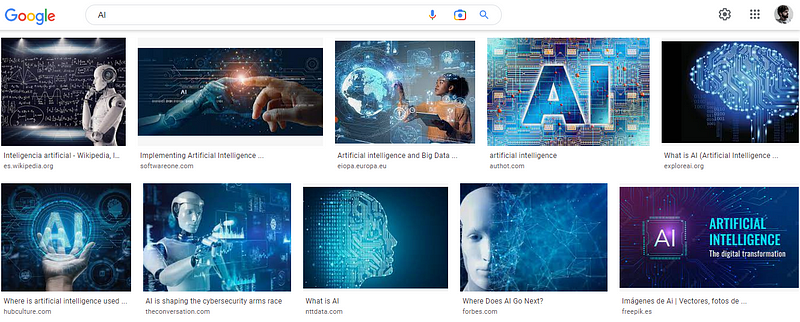The Celebrity Status of AI: What It Means for Our Future
Written on

Recently, I had a discussion with journalists investigating large language models for a prominent news program. I articulated what draws so much attention to AI and why it has emerged as a leading topic of interest in recent years. In the course of our conversation, I likened AI to a celebrity technology.
Individuals—including policymakers, investors, corporate leaders, and academics—approach AI and its applications with a different level of enthusiasm than other technologies that also hold significant potential, such as biotechnology, quantum computing, and renewable energy. The level of attention AI receives does not necessarily correlate with its actual utility, no matter how substantial it may be.
While my comparison may not be perfect, it closely mirrors how we view human celebrities across various fields like sports and entertainment. These figures often dominate public attention not solely due to their contributions, but due to a more nebulous notion of fame—akin to Kim Kardashian, who is famously known for simply being famous.
Although it may seem unfair to equate AI with a pop culture figure, it is clear that AI enjoys immense popularity, even if its outcomes don’t always justify the surrounding buzz. I have pondered this dynamic for some time, and the term "celebrity" best encapsulates what I am trying to convey. This article will elaborate on why AI has garnered this status and what it means for the technology landscape.
What Sets AI Apart as a Celebrity Technology
Since the field’s inception in 1956, AI has been subjected to intense scrutiny and high expectations. Initially, no one could foresee the advancements that would arise from the integration of cognitive science with information theory and computation. However, even then, the ambitious objectives of AI sparked interest, as they sought to unlock the complexities of human intelligence—the most intricate structure known to humanity.
The deep learning surge of the last decade has further solidified AI's reputation as a celebrity technology, although it is not the root cause of this phenomenon. The unique blend of characteristics that AI possesses sets it apart from other technologies.
Ambitious Goals
One of the primary reasons AI stands out is its audacious goals. Some proponents argue that AI could be pivotal in resolving significant future challenges, a stance I find overly optimistic. The vision of creating artificial general intelligence (AGI), which could evolve into superintelligence, raises the possibility of addressing any problem—foreseen or unforeseen. Philosopher Nick Bostrom posits that “machine intelligence will be the last invention humanity ever needs to make,” suggesting that machines may outpace humans in innovation.
Those who currently face fewer problems are understandably captivated by the potential of AI. It is often the wealthiest individuals who wield the power to steer the direction of AI research and application. The significant financial backing AI has received in recent years is a reflection of the technology's ability to attract investment, but other emerging technologies like biotech and renewable energy also draw substantial funding, leaving us to ponder why AI’s status is so distinct.
Fundamental Questions of Humanity
AI resonates with us because it intertwines with essential questions about human existence. From its very name, "artificial intelligence," to its ultimate goals of deciphering intelligence and constructing superhuman capabilities, AI is inextricably linked to our identity.
The terms we employ to describe AI—such as neural networks and deep learning—are derived from cognitive science. Many companies develop human-like robots and train AI models to excel in language and visual recognition. AI is essentially a research domain mirrored after cognitive science, both striving to unravel the mysteries of human intelligence.
While neuroscience focuses on understanding the biological foundations of intelligence, AI aims to create new forms of intelligence. This approach fosters rapid advancements and keeps the field vibrant and exciting, in contrast to the slower, more methodical pace of neuroscience.
Influence of Popular Culture
Cultural narratives evolve alongside technological advancements and can significantly shape public perceptions of science and technology. Numerous books and films have propagated specific depictions of AI, which influence how we conceptualize the technology. The collective imagination surrounding AI differs vastly from that of other fields like neuroscience.
When discussing AI’s future, many people immediately think of iconic representations such as Skynet from Terminator or HAL 9000 from 2001: A Space Odyssey. These cultural references are only the most apparent influences; subtler cultural portrayals continuously shape our understanding of AI. A quick search for “AI” on Google reveals a plethora of humanoid robots and glowing brain imagery, reinforcing a narrow view of what AI truly encompasses.

Moreover, popular culture not only enriches our imagination but also evokes emotional responses. Few individuals approach AI with a rational perspective on its true capabilities. Instead, many either fear potential job losses and existential risks or harbor hopes for a utopian future devoid of suffering.
Enhanced Capabilities
Last but not least, current AI methodologies are outperforming any previous iteration. Systems based on deep learning, fueled by powerful supercomputers and vast datasets, have accomplished tasks previously deemed impossible for machines, from advanced recognition tasks to mastering complex games and even artistic endeavors.
The broad applicability of AI and the successes of deep learning bolster initial predictions about the technology's potential, providing compelling reasons for continued investment. Given AI's historically tumultuous journey—marked by cycles of excitement and disillusionment—this era of consistent advancements represents a golden age for AI.
The intersection of lofty aspirations, profound questions about humanity, cultural influences, and technological efficacy contributes to AI's celebrity status. However, the consequences of such prominence warrant scrutiny.
Consequences of AI's Celebrity Status
AI's unique combination of attributes fuels our fascination with it; yet, celebrity status does not equate to positive outcomes. While AI holds immense potential, this comes with challenges that may hinder progress and create complications for those striving to meet societal expectations.
Corporate Incentives
The immediate consequence of AI's stardom is the eagerness of companies to integrate AI into their offerings. Businesses may adopt AI technologies even when unnecessary, simply to market themselves as "AI-powered" to consumers and investors—akin to using a sledgehammer to kill a fly. Others might employ basic statistical methods but label them as AI.
Companies that create AI—like Google and Meta—possess strong financial incentives to monetize AI technologies, regardless of their readiness for deployment. Notable examples of AI systems introduced with detrimental effects include crime prediction tools in Chicago and content recommendation algorithms on platforms like TikTok.
The fallout can be severe, ranging from racially insensitive labeling to tragic consequences for vulnerable users. In all cases, the priority appears to be the deployment of AI over ensuring safety.
Public Desensitization
Just as tech firms are incentivized to promote AI, media outlets are driven to discuss it—often exaggerating the capabilities or implications of these systems. This stems from the “attention economy,” where headlines compete for clicks. A sensational claim about Tesla developing a humanoid robot is more compelling than a more measured statement about their uncertain timeline.
As public exposure to AI increases, so do expectations, which often outpace reality. This disconnect can lead to disillusionment and fatigue among those who follow AI developments. Many people who are intrigued by AI may become confused by the exaggerated narratives presented by mainstream media, resulting in a distorted understanding of the technology.
This misalignment can create a rift between those developing AI and the general public, which is detrimental to both sides and to the overall field.
The Hype Cycle
The issues discussed in this section relate directly to AI's hype—the disparity between the true state of AI and public perception. These inflated expectations arise from AI's celebrity status and are perpetuated by researchers, tech companies, businesses, politicians, and investors involved in the field. Those who do not openly address the pitfalls of AI hype contribute to its celebrity-like image.
The ultimate risk of failing to meet these inflated expectations is "de-celebritization," also known as an AI winter. Few technologies are as susceptible to funding downturns as AI. Due to its unique characteristics, the perceived value of AI can become disconnected from its actual capabilities, leading to eventual collapse.
This phenomenon has occurred twice before, and despite the current successes of deep learning, it could happen again. Investors, who ultimately determine AI’s fate, may withdraw support if they feel their expectations have been unmet, initiating another cycle of re-evaluation.
Subscribe to **The Algorithmic Bridge*. Bridging the gap between algorithms and people—a newsletter about the AI that matters to your life.*
You can also support my work on Medium directly and get unlimited access by becoming a member using my referral link **here*! :)*